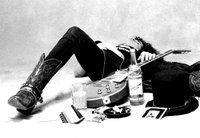Beyond Me: A Novela to Celebrate the Birth of a Centaur
“Science, art, and philosophy are growing together in me so that in any case I shall one day give birth to centaurs.”—Nietzsche
Formative
“There she stood victorious in the good fight that she had waged all her life against the onslaught of reason. There she stood, hunchbacked and tiny, trembling with certainty—an inspired scolding little prophet.” –from Thomas Mann’s The Buddenbrooks
The day Edna Lucette Stavrogin was born was the day this prophet died. Did Edna inherit the traits of the prophet? Or contrarily, was she the insolent representative of a new generation? Edna herself argued that it was neither strict inheritance nor a feat of creationism that lent support to her historic positioning. But Edna’s voice on the matter should be silenced and the reader will be permitted to choose her own adventure. Now don’t let the question derail you for its quite marginal to the narrative that is about to unfold.
Getting back to the beginning, Edna’s exile from the womb, it just so happened to occur on the nebulous moment, 11:27 am, when William Harvey discovered human circulation and the exact month that commemorated the centennial of the assembly line. Of greater coincidence, and fiercely marking Edna’s birth date, was the battering of hurricane Charley on the Southeastern corner of the United States, which produced a large power outage, preventing Mrs. Larson of Vero Beach from calling her son in Buffalo to congratulate him on his job promotion. Luckily, and by the grace of God, Edna was born in the Midwestern United States in a hospital that remained largely ignorant of the conceited damages a hurricane could inflict.
Straying further, it was in the sterility of this hospitable where Edna first felt uncomfortable, albeit with infant consciousness. As she grew up she was able to feel, and by age fourteen properly articulate, a more abstract uncomfortable; the apex of her “uncomfortable” responding to the strings of observations and labels that were cast upon her by adult onlookers, notably her parents, but certainly to include the perfumed Aunt and the unfortunate business associate who was somehow a family friend. Edna became becomingly peevish in the face of such onslaught.
For example, after being referred to, and dismissed (the identity puzzle pieced), by one such onlooker, as an “amiable poet” she responded insolently, and with the hushed breath of a tiny spider--a soliloquy unfit for human ears:
‘Sorry but that identity doesn’t quite work with my green eyes and morbid intellect…I think I’d much prefer Tuesday gardener and Saturday night slut. But, you know when I come of age, or when I re-come of age as I will inevitably do as a forty-year-old spinster, as the genealogy of my name suggests, I could certainly plan on cultivating the disposition of a poetress. Or better yet, I could project this desired persona onto various youths and live vicariously through the labels I so freely give to the unsuspectingly innocent. But, no, I take your suggestion to heart. In fact, I could begin now as poet-in-suburban residence. But, I’m just not sure if I, or any decent poet for that matter, could manage the amiable, as it would require shedding the artiste persona and having a faithful audience who reads poetry. And frankly that’s just hard to find these days. And with further frankness, what are poets if stripped of their ability to wallow in pursuit of an audience?’
Wait, wait! Apologies, but this really wasn’t her tone at all. You see she’s already trying to trick you; acting like one of those actor types, please! Really and actually, Edna is sitting right there under that tree. She’s a shy little thing…has a lot going on in that there head of hers. Don’t really know what, but maybe it will come out one of these days. See her eyes (motioning to the reader with an extended index finger) they are busy with her brain.
“What lies beneath her thickening cranial bone? [an eerie voice of a mad scientist enquired]…Let us, dear reader, enter the laboratory!” The lights flicker pursued by a demonic scream.
* *
Throughout Edna’s childhood guardians had treated her with an inquisitive and distrustful reserve. They seemed to notice a certain deviousness that could perchance creep out from her temperate and shy disposition. This worried them greatly and so they taught her many crafts that would occupy her hands, lest they fall into an idleness that would promote drugs, decadence, and abortions. Needless to say; yet still saying (for the benefit of the reader’s warm visualizations to come), the early years of Edna’s hand-eye-coordination development were spent knitting, gardening, making brown clay vases, and painting bourgeois floral designs on white 6 x 6 tiles.
[1] As Edna’s hands learned steadiness and occupation her mind was free to wander. Thus, she came to appreciate the monotony of her kitsch artistry as secret passages to imaginative realities. She could sit, perceived as patient and occupied, with the most adventurous or perverse thoughts and nobody would suspect; no observers questioning beyond the produced floral designs.
Now sometimes amidst this introspection Edna would feel a slight sad, nowhere near the realm of depression. It was more a feeling of shameful neglect--her mind had abandoned so much of present reality that her onlookers could not sufficiently comprehend let alone participate in her tangled private thoughts. To make up for this, when Edna was in her most common other realm, that of the utopian village she presided over as sole creator, she often appropriated the characters and habits from her real life and restored them to the civic picturesque.
Her village had no geographic bounds, but was resettled daily from family-oriented cowboy Western to an underwater mixed human and whale orphanage. It should be noted (with little consequence) that there were always flourishing moral economies within all of the villages. And it was this bartering system of exchange that necessitated the arrival of new inhabitants. For her imagined creatures (they were not always human) desired new trading sources to procure all sorts of goods ripe for their consumption.
Stretching this anecdote further, it was typically the protagonist of the fantasy, who resembled a more perfect Edna (whether she be in Orca or human flesh), who had to overcome some injustice—the structural cruelty of the orphanage or the snobbish personality of the pastor’s daughter. There was never any full resolve, but merely time for a wonderfully delivered monologue by Edna’s embodied persona to call attention to the injustice. The power of her oration in the face of evil was persuasive enough to silence the wrong-doing or at least to end her fantasy on a high note of expressive ecstasy. Then she would re-emerge finding her floral craftsmanship to be pleasantly mediocre; fixed in its normalcy.
[1] This occupation with crafts politely tagged Edna with a “creative” disposition.




